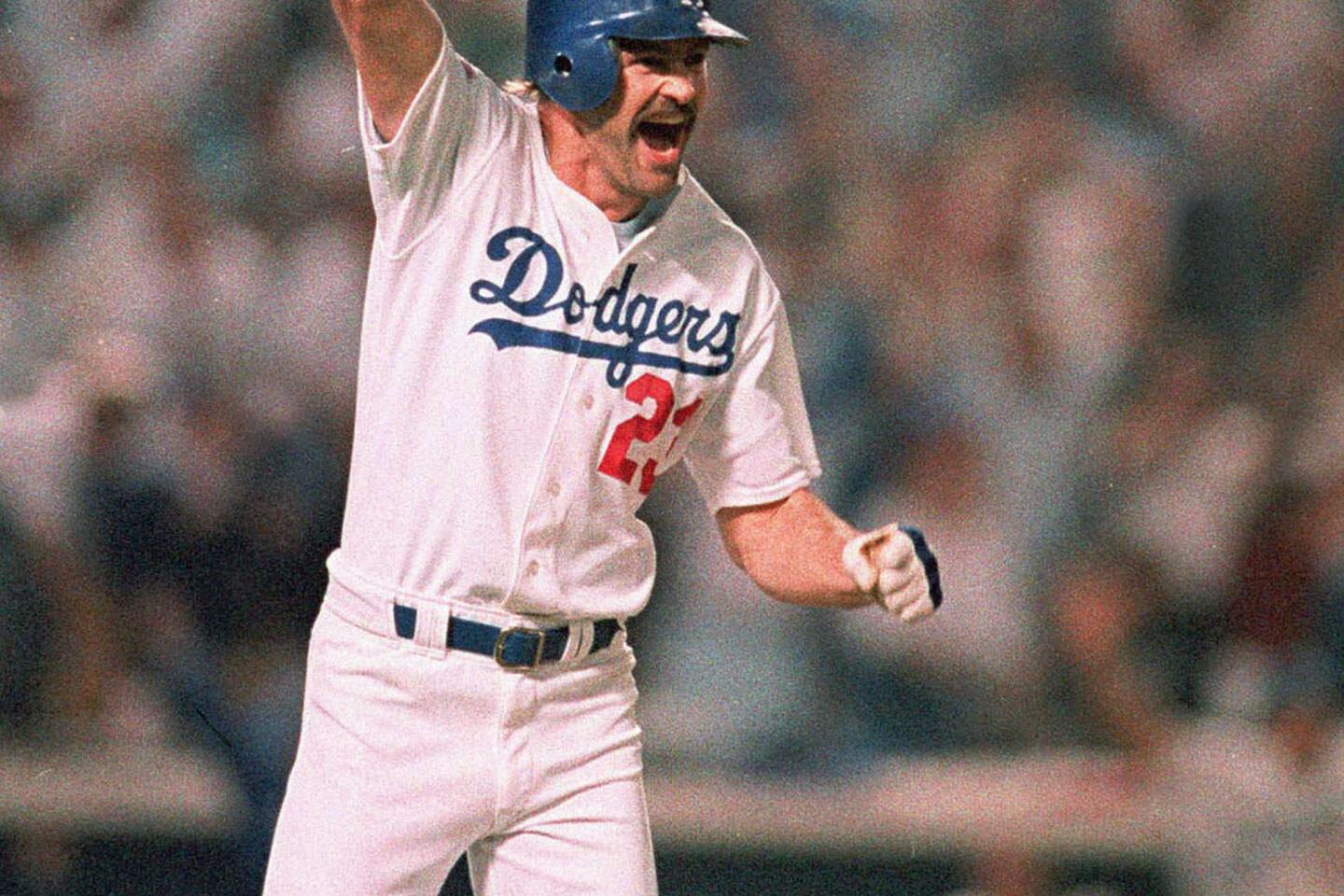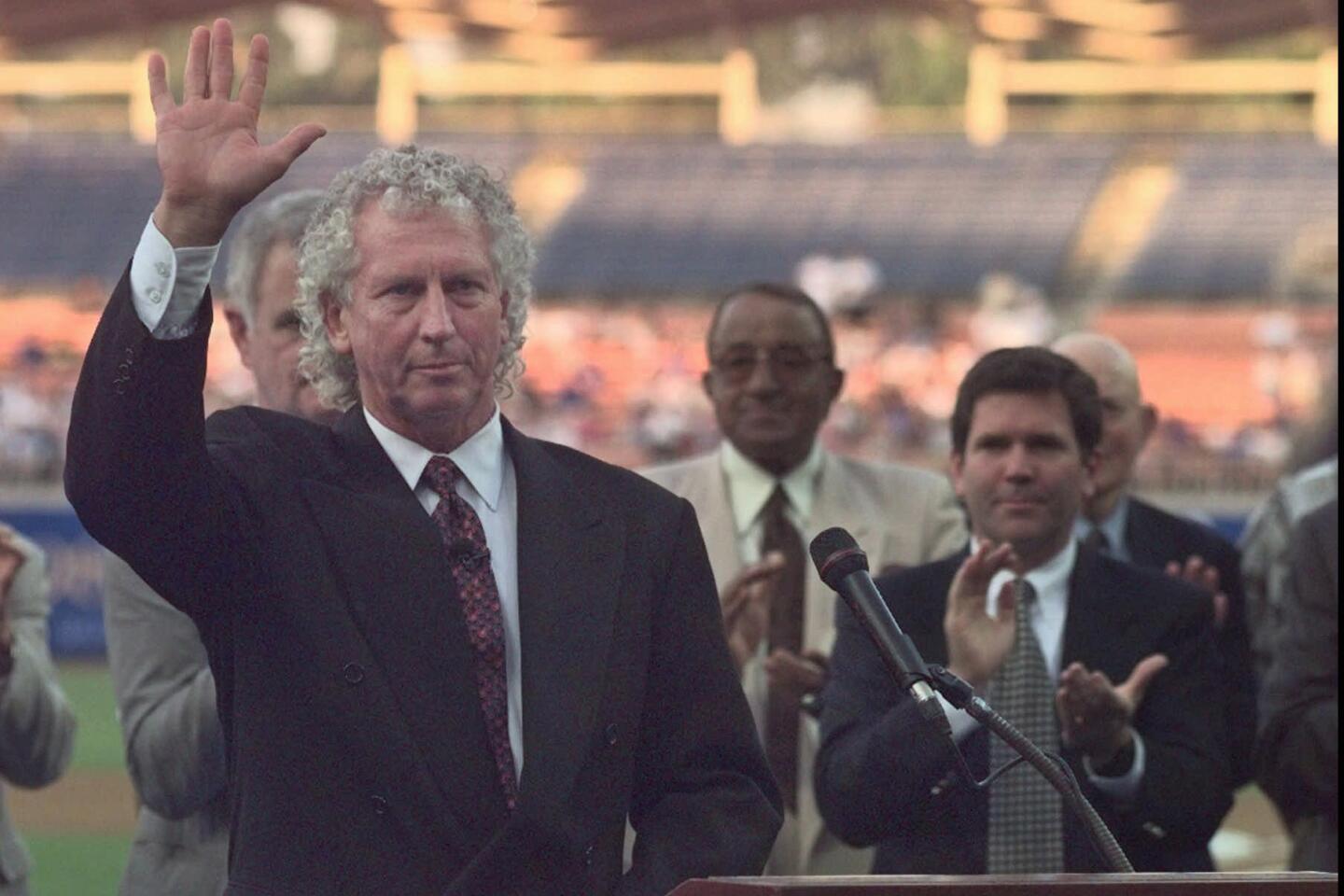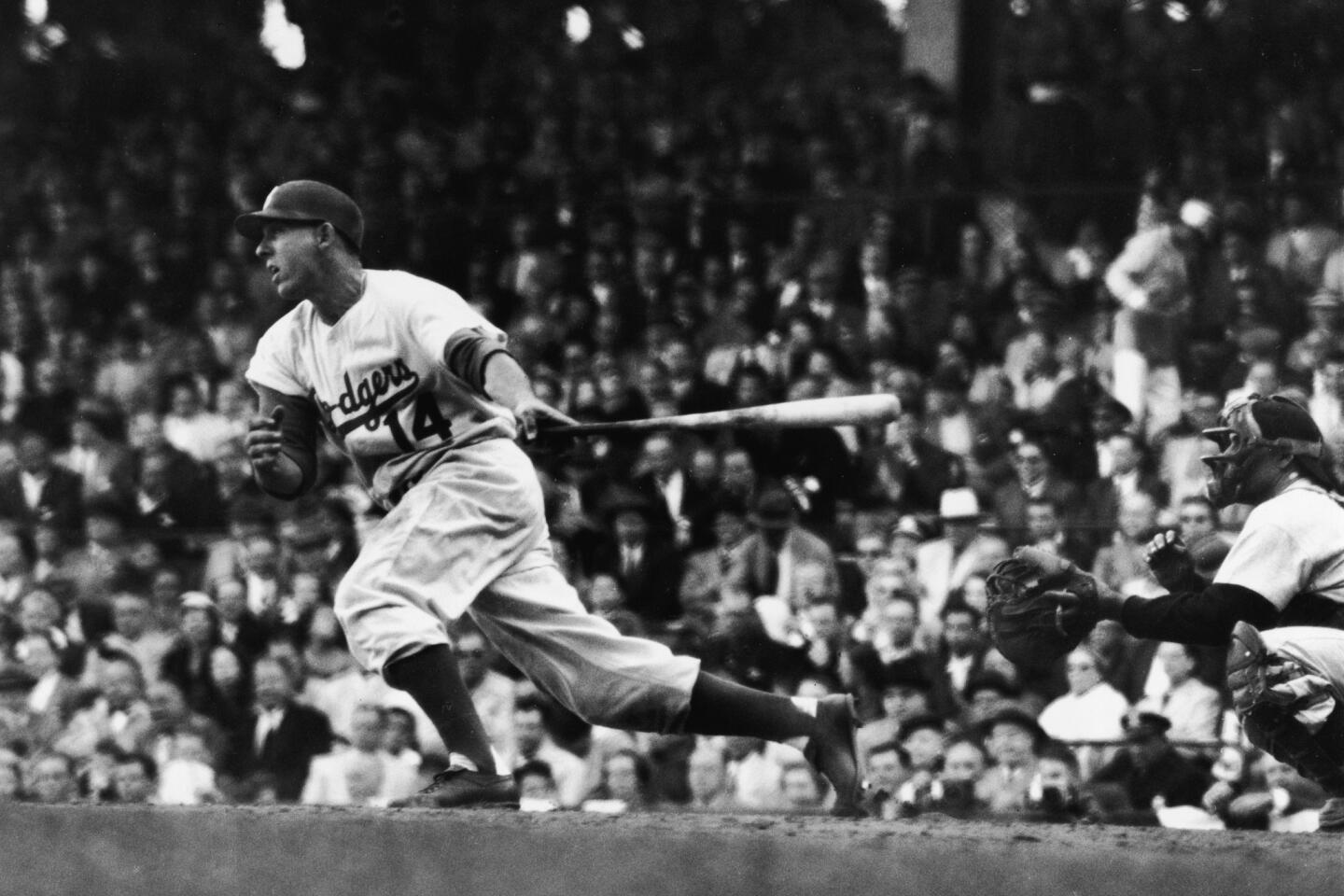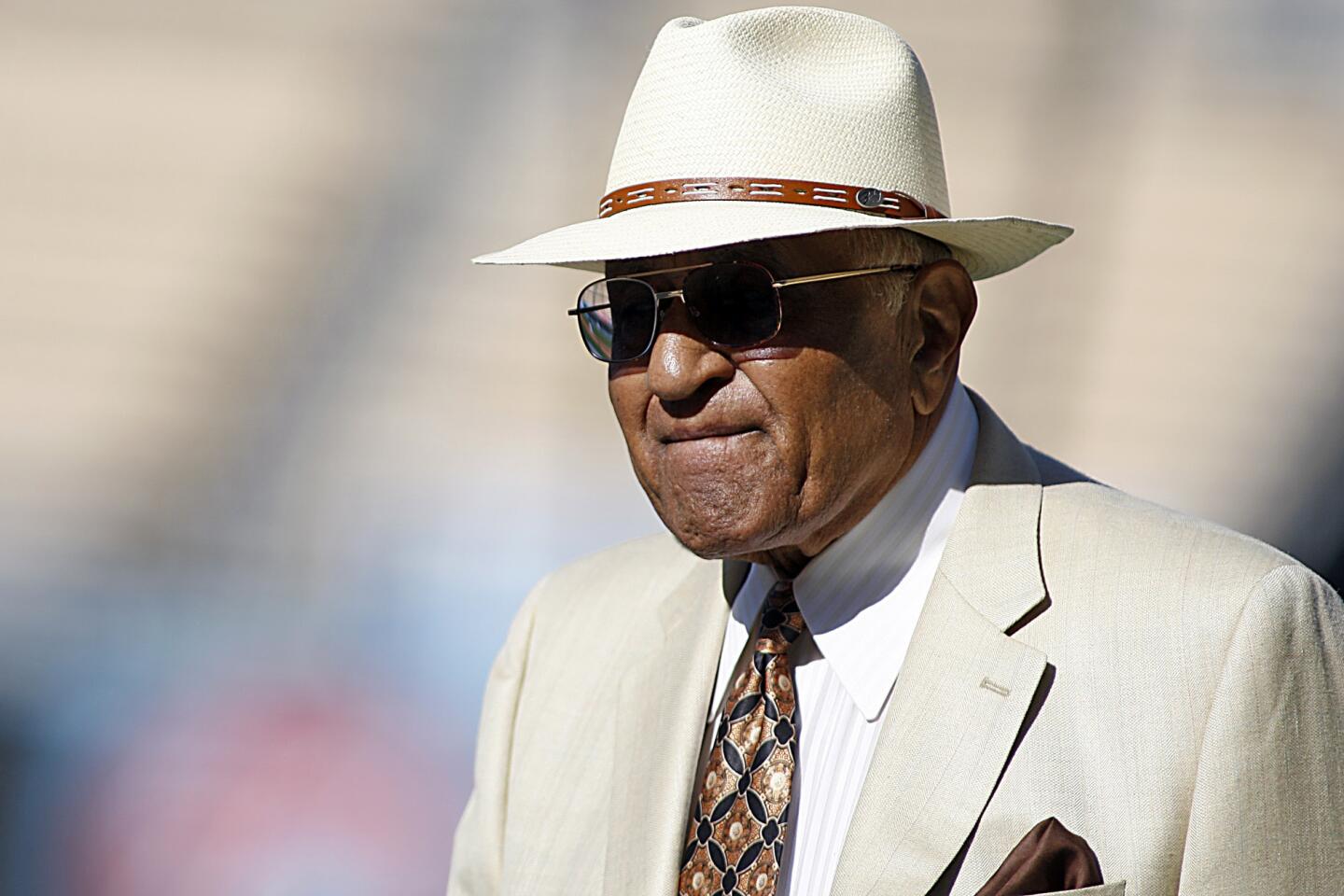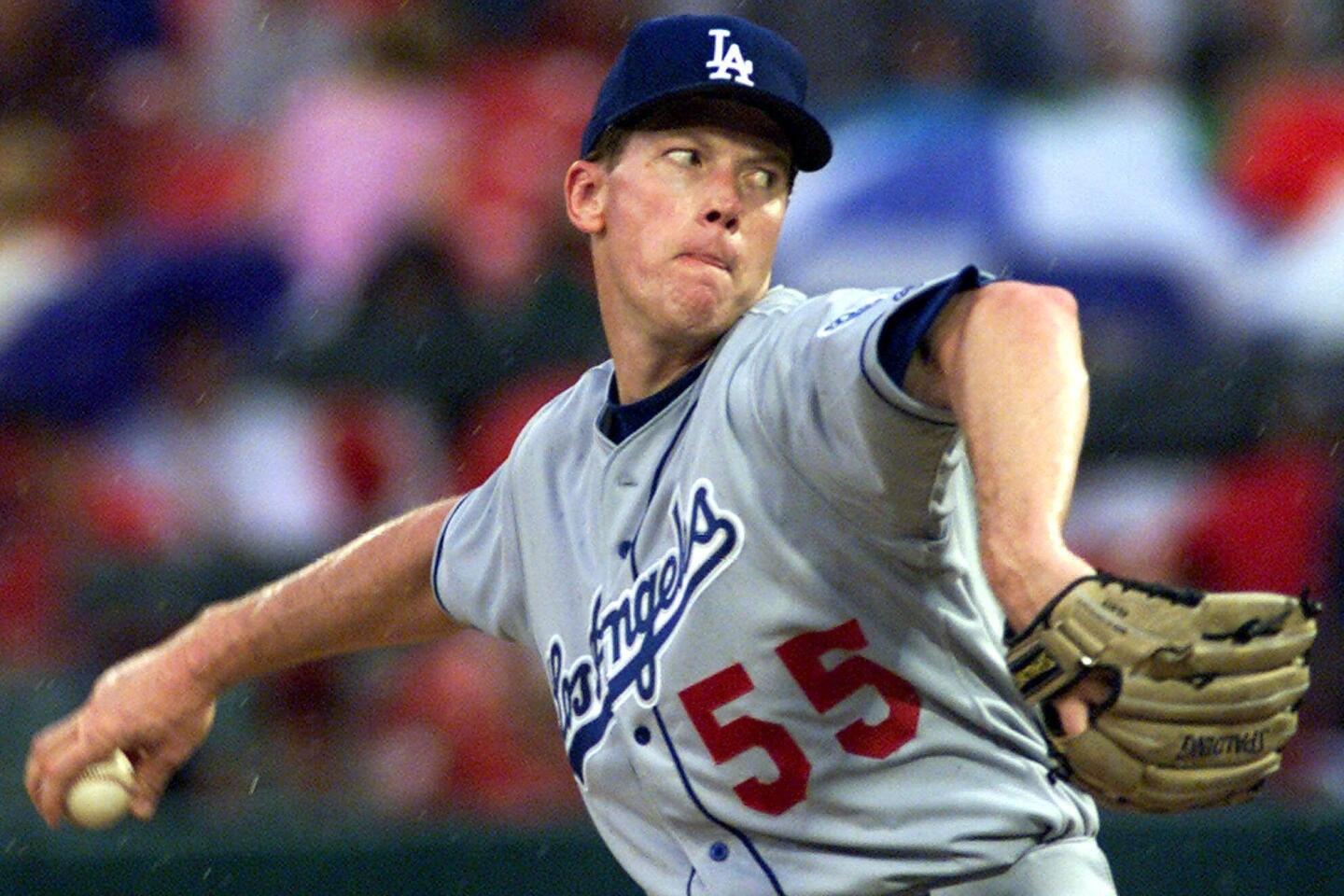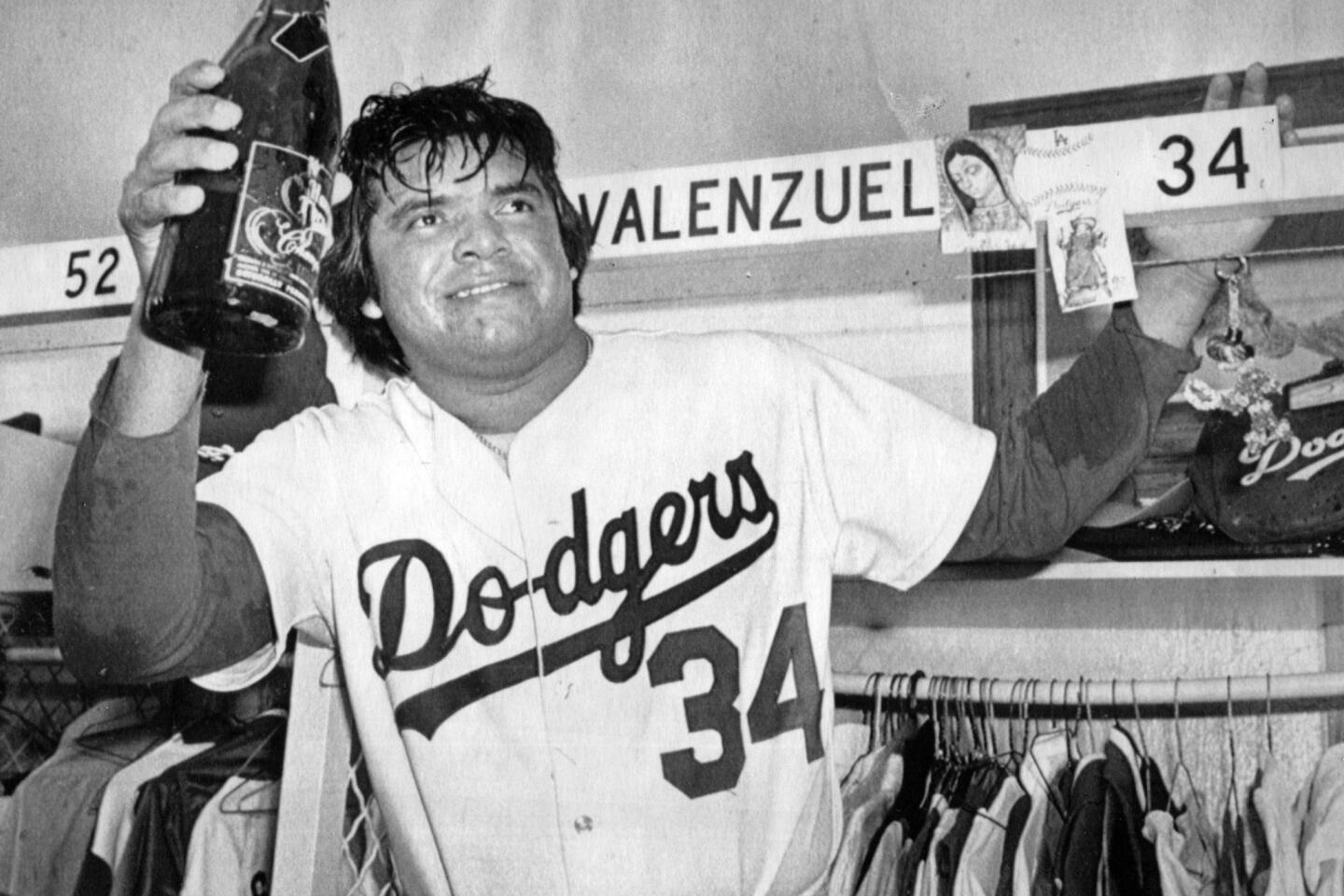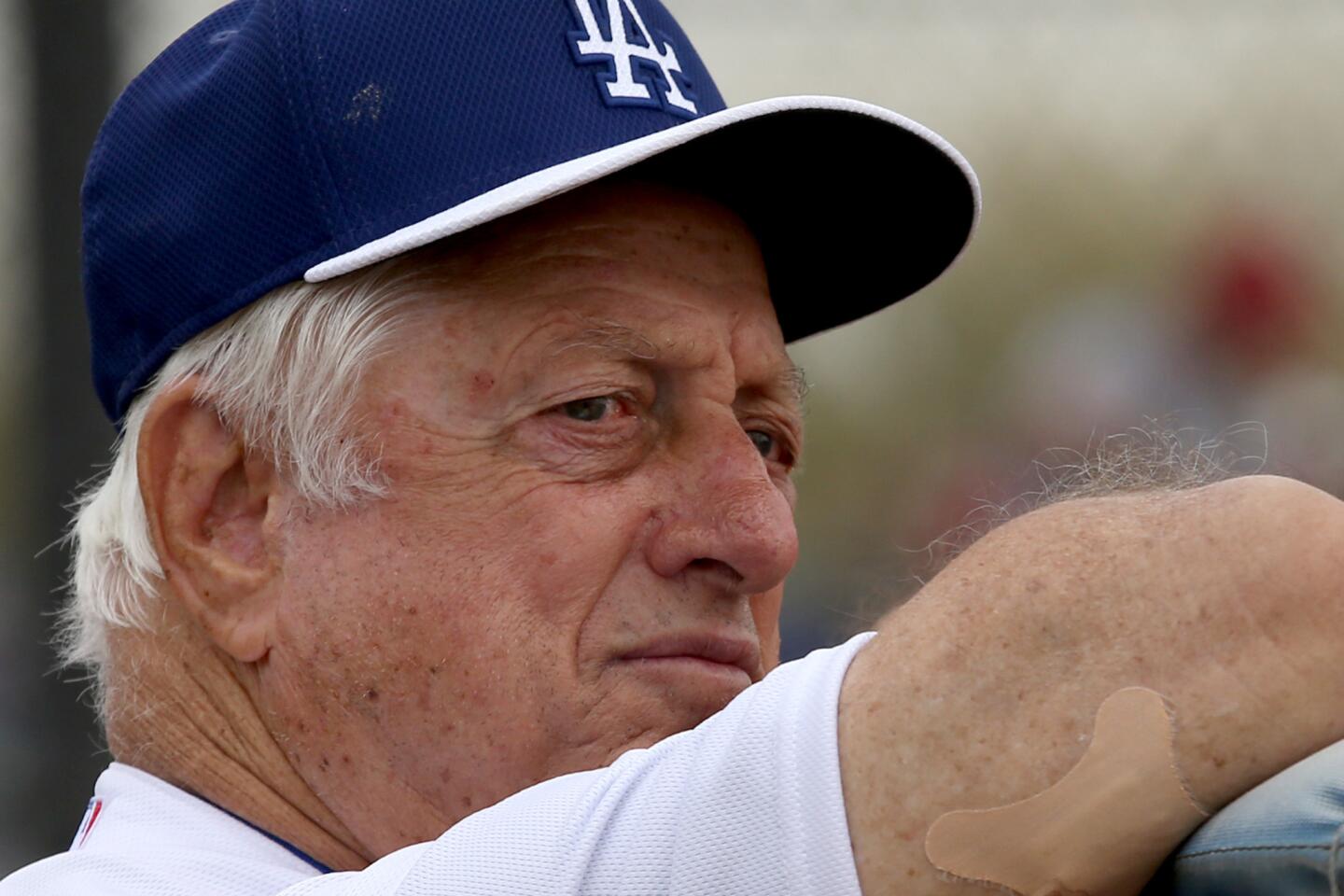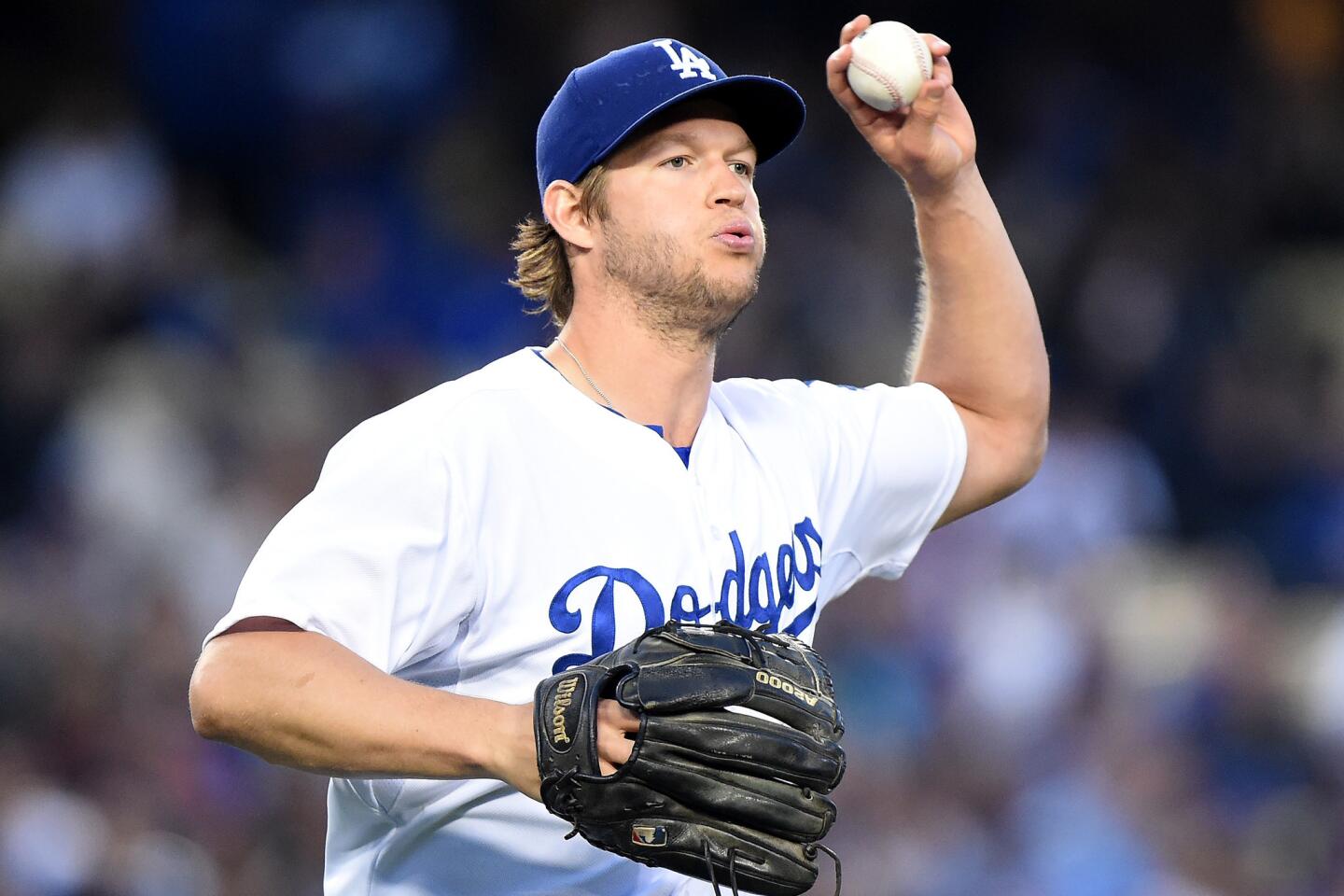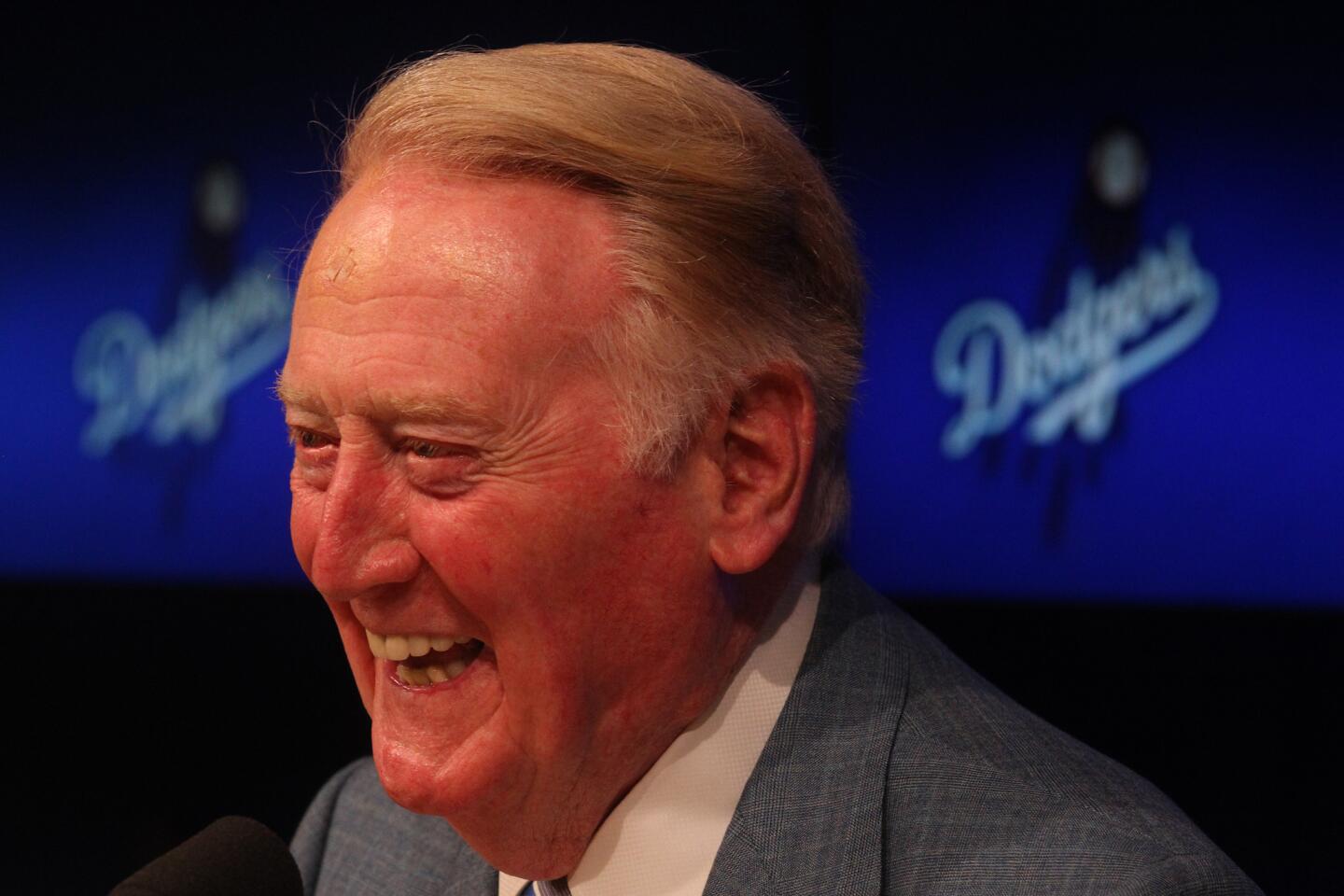The 20 greatest Dodgers of all time, No. 17: Don Newcombe
- Share via
We asked you to list your choices for the 10 greatest Dodgers of all time. You could vote via comment, Facebook, Twitter or email. And vote you did. We received an amazing 14,383 ballots. So many, that we have decided to expand the list from the top 10 to the top 20.
You were asked to rank your top 10 in order. We assigned points, with your choice for first getting 12 points, second getting nine points, third getting eight points, all the way down to one point for 10th place. Each weekday here, we will unveil the top 20, one at a time, until we reach No. 1.
So without further ado:
No. 17: Don Newcombe (7 first-place vote, 11,749 points)
Don Newcombe had one of the best rookie seasons in history in 1949, winning the Rookie of the Year award after finishing 17-8 with a 3.19 earned-run average and a league-leading five shutouts. He followed that up with 19-11 and 20-9 season, before missing two years because of military service during the Korean War.
Subscribe to our free Dodgers newsletter here
He returned to the Dodgers during the 1954 seasons, and, after a 9-8 season, had two of the best years in Dodgers history, finishing 20-5 as the Dodgers won the World Series in 1955, and following it up with a 27-7 season in 1956, winning the Cy Young and MVP award, making him the first of only two pitchers to win all three major awards (ROY, Cy Young and MVP) in his career. Detroit’s Justin Verlander is the other pitcher.
1956 was also his last great season, as he became a mediocre pitcher at best after that. He came west with the Dodgers in 1958 but was traded to Cincinnati after going 0-6 in his first eight starts for Los Angeles.
Newcombe was also one of the best-hitting pitchers in history, batting .271 in his career with 15 home runs.
Years later, Newcombe blamed alcoholism for the decline of his career and his since helped numerous other major leaguers defeat their substance abuse problems.
“I’m glad to be anywhere when I think about my life back then,” Newcombe said in 2010. “What I have done after my baseball career and being able to help people with their lives and getting their lives back on track and they become human beings again -- means more to me than all the things I did in baseball.”
Full List: See the top 20 greatest Dodgers of all time
That same year, former Dodgers great Maury Wills, who Newcombe helped overcome years of substance abuse, said, “Don Newcombe saved my life. He was a channel for God’s love for me because he chased me all over Los Angeles trying to help me and I just couldn’t understand that -- but he persevered -- he wouldn’t give in and my life is wonderful today because of Don Newcombe.”
No. 18: Gil Hodges (No first-place votes, 11,344 points)
Why isn’t Gil Hodges in the Hall of Fame?
The man is an eight-time All Star, hit 370 home runs, hit .273 with an on-base percentage of .359, is one of only 16 people to hit four homers in one game, was an integral part of two World Series championships as a first baseman and managed the Miracle Mets to the 1969 World Series title.
OK, we’re supposed to be focusing on his Dodgers career here. So, for the Dodgers he ranks 15th in slugging percentage (.488), fourth in games played (2,006), fifth in runs scored (1,088), ninth in hits (1,884), ninth in doubles (294), second in homers (361) and second in RBIs (1,254).
He was a key member of the 1955 and 1959 World Series title teams. He won three gold gloves at first base, and would have had more, except they didn’t start awarding gold gloves until near the end of his career.
Hodges died of a heart attack in 1972 at the age of 49.
After his death, many of his former Brooklyn teammates talked about what a great person and player he was.
Jackie Robinson: “He was the core of the Brooklyn Dodgers.”
Duke Snider: “Gil was a great player, but an even greater man.”
Don Drysdale: “Gil’s death absolutely shattered me. I just flew apart. I didn’t leave my apartment in Texas for three days. I didn’t want to see anybody. I couldn’t get myself to go to the funeral. It was like I’d lost a part of my family.”
No. 19 Don Sutton (No first-place votes, 10,332 points)
You know you have a rich history when your team’s all-time leader in wins and strikeouts can finish only as the 19th-best Dodger in history.
Sutton pitched for the Dodgers from 1966 to 1980 and again in 1988. He leads the team in wins (233), games as a pitcher (550), innings pitched (3,816.1), strikeouts (2,696), shutouts (52) and losses (181).
Sutton was the Dodgers’ opening-day starter from 1972 to 1978. His seven opening-day starts tie him with Don Drysdale for most all-time for the Dodgers.
Sutton’s numbers were downplayed by some voters because of his longevity, with some voters saying that the only reason he is the career leader in so many categories is because he pitched for so long, with some not considering him to ever be an ace of the staff.
Sutton was inducted into the Baseball Hall of Fame in 1998 and had his number (20) retired by the Dodgers the same year.
No. 20: Kirk Gibson (no first-place votes, 9,421 points)
Gibson received a late surge of votes, probably due to his recent announcement that he has Parkinson’s disease. The late surge moved him past Hall of Famer Zack Wheat for the No. 20 spot.
Gibson is here for one reason and one reason only: The Home Run.
The Oakland A’s were heavily favored to defeat the Dodgers in the 1988 World Series, and it looked as if Oakland would move one step closer to the title in Game 1.
With the A’s leading, 4-3, closer Dennis Eckersley came on to pitch the ninth inning. After retiring the first two batters, Eckersley issued a walk to pinch-hitter Mike Davis, bringing a hobbled Gibson to the plate to bat for reliever Alejandro Pena. Gibson had two bad legs (a pulled left hamstring and a swollen right knee) and hadn’t been expected to play at all in the game.
Gibson fouled off several Eckersley pitches, hobbling around the plate after every swing. It looked hopeless. Even if he hit the ball, it didn’t seem like he would be able to run to first base. With the count 2-and-2, Gibson fouled off several pitches before taking ball 3 as Davis stole second. Gibson then drove the next pitch, a backdoor slider, into the right field bleachers to win the game. The Dodger Stadium crowd was as loud as it has ever been as Gibson limped around the bases, pumping his fist as he rounded second.
The homer gave the Dodgers a 5-4 victory. It was Gibson’s only at-bat of the series, which the Dodgers won in five games.
By the time Kirk Gibson reached his locker after Game 1, bullpen coach Mark Cresse had written “R. HOBBS” on a piece of paper and taped it over Gibson’s nameplate, a reference to the fictional slugger played by Robert Redford in “The Natural.”
In interviews after the game, Gibson said that Dodgers scout Mel Didier had provided a report on Eckersley that claimed with a 3–and-2 count against a left-handed power hitter, one could be absolutely certain that Eckersley would throw a backdoor slider. Gibson said that when the count reached 3–and-2, he stepped out of the batter’s box and, in his mind, could hear Didier’s voice, with its distinctive Southern drawl, reiterating that same piece of advice.
And that was enough to lift a guy who played only three seasons in L.A. into a spot among the 20 greatest Dodgers of all time. You can watch the entire bottom of the ninth inning of that game in the video above.
More to Read
Are you a true-blue fan?
Get our Dodgers Dugout newsletter for insights, news and much more.
You may occasionally receive promotional content from the Los Angeles Times.
